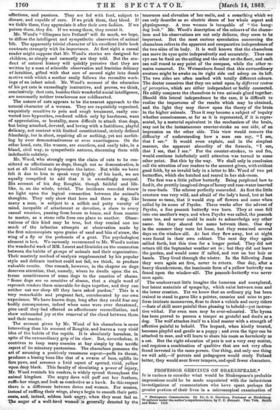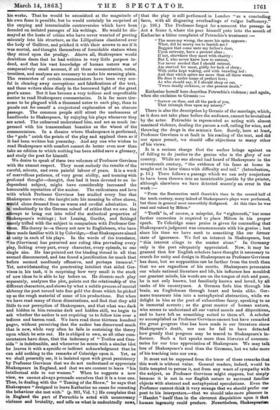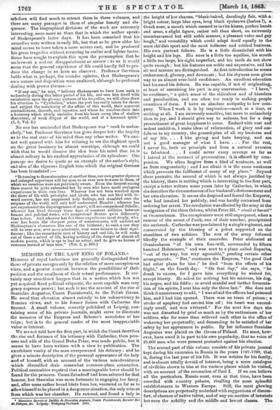PROFESSOR GERVINUS ON SHAKESPEARE.*
IT is curious to consider what would be Shakespeare's probable impressions could he be made acquainted with the industrious investigations of commentators who have spent perhaps the greater portion of their lives in a microscopical examination of .• Shakespeare Commentaries. By Dr. G. G. Gervinus, Professor at Heidelberg. Traislated under the author's superintendence, by F. E. Bunnell. Two Vole. Smith and Elder. 1863. his works. That he would be astonished at the magnitude of his own fame is possible, but lie would certainly be surprised at the carping and interminable controversies which have been founded on isolated passages of his writings. He would be dis- mayed at the hosts of critics who have never wearied of peering minutely into his structure, as the Lilliputians clambered over the body of Gulliver, and pricked it with their arrows to see if it was mortal, and thought themselves of formidable stature when they stood upon the prodigy. Above all, Shakespeare would doubtless deem that he had written to very little purpose in- deed, and that his vast knowledge of human nature was of comparatively small account, if all these commentaries, notes, treatises, and analyses are necessary to make his meaning plain. The researches of certain commentators have been very use- ful in clearing away corruptions and falsifications of the text, and these writers shine dimly in the borrowed light of the great poet's name. But it has become a very tedious and unprofitable matter to read Shakespeare commentaries. It is far more tire- some to be plagued with a thousand notes to each play, than to puzzle out for oneself a conjectural explanation of an obscure passage. The common people still attest the uselessness of handbooks to Shakespeare, by enjoying his plays whenever they are acted. The unlearned understand him, and are as much im- pressed with his transcendant beauties as the wisest of the commentators. In a theatre where Shakespeare is performed, the "gods " catch the points of the play and applaud them as if it had been written but yesterday. And any one who wishes to read Shakespeare with comfort cannot do better even now than take an edition to which nothing has been added save a glossary, and study the poet for himself.
We desire to speak of these two volumes of Professor Gervinus with the utmost respect. They must embody the results of the careful, minute, and even painful labour of years. It is a work of marvellous patience,. of very great ability, and teeming with profound thought—thought, that had it been devoted to an in- dependent subject, might have considerably increased the honourable reputation of the author. The enthusiasm and love with which Professor Gervinus has studied every line that Shakespeare wrote ; the insight into his meaning he often shows, would alone demand from us warm and cordial admiration. It is undoubtedly to the German school of critics that we owe the attempt to bring out into relief the resthetical properties of Shakespeare's writings ; but Leasing, Goethe, and Schlegel merely trifled with the subject in comparison with Professor Ger- vinus. His theory is—a theory not new to Englishmen, who have been made familiar with it by Coleridge,—that Shakespeare aimed at unity in each of his plays. In the words of the translator, "he (Gervinus) has perceived one ruling idea pervading every play, linking every part, every character, every episode, to one single aim. He has pointed out the binding thread in all that seemed disconnected, and has found a justification for much that before seemed needlessly offensive, and perhaps immoral." Yet, notwithstanding the penetrating intellect that aided Ger- vinus in his task, it is surprising how very small is the stock of new ideas he is able to lay before us. He dissects each play separately, analyzes the plot, points out the relationship of the different characters, and shows by what a subtle process of mental alchemy the poet turned into fine gold the dross which he picked up as the rough material of some of his productions. But when we have read many of these dissertations, and find that they add little to our perception of Shakespeare, and that what Was dark and hidden in him remains dark and hidden still, we begin to ask whether the author is not requiring us to follow him over a tedious and barren road. We have read these thirteen hundred pages, without perceiving that the author has discovered much that is new, while very often he fails in sustaining the theory upon which he sets out. He is obliged to own, as all other com- mentators have done, that the indecency of "Troilus and Cres- sida," is indefensible, and whenever he meets with a similar blot he leaves it with a specific or indirect acknowledgment that he can add nothing to the remarks of Coleridge upon it. Yet, as we shall presently see, it is insisted upon with great persistency by Professor Gervinus that we do not understand or appreciate Shakespeare in England, and dust we are content to leave "his intellectual side to our women." When he suggests a new view, we cannot always persuade ourselves that it is a true one. Thus, in dealing with the "Taming of the Shrew," he says that Shakespeare "designed to leave Katharine no cause for resenting the behaviour she met with." (p. 201, Vol. 7.) He complains that in England the part of Petruchio is acted with unnecessary violence and brutality, and tells us what is undoubtedly news,
that the play is still performed in London "as a concluding farce, with all disgusting overloadings of vulgar buffoonery."
(p. 196.) The Professor forgot for a moment the passage in
Act 4 Scene 3, where the poet himself puts into the mouth of Katharine a bitter complaint of Petruchio's treatment :—
" The more my wrong, the more his spite appears :
What, did he marry me to famish me ?
Beggars that come unto my father's door, Upon entreaty, have a present alms ; If not, elsewhere they meet with charity : But I, who never knew how to entreat, Nor never needed that I should entreat, Am starved for meat, giddy for lack of sleep ; With oaths kept waking, and with brawling fed : And that which spites me more than all these wants, He does it under name of perfect love; As who should say, if I should sleep or eat, 'Twere deadly sickness, or else present death."
Katherine herself here describes Petruchio's violence; and again, when she exclaims to Grumio :—
" Sorrow on thee and all the pack of you, That triumph Lis upon my misery."
There is also the description by Gremio of the marriage, which, as it does not take place before the audience, cannot be brutalized by the actor. Petruchio is represented as acting with almost maniacal violence, dealing the parson a cuff, calling for wine, and throwing the dregs in the sexton's face. Surely, here at least, Professor Gervinus is at fault in his reading of the text, and did our space permit, we should offer objections to many other of his views.
It is a serious charge that the author brings against ua of failing to do justice to the genius who is the glory of our country. While no one abroad had heard of Shakespeare in the seventeenth century, "the evidence of his fame at home is sought out in later times with difficulty and toil." (Introduction, p. 11.) There follows a passage which we can only conjecture to have been thrown into an inextricable jumble by the printer, although elsewhere we have detected scarcely an error in the work :—
" From the Restoration until Garrick's time in the second half of the tenth century, many indeed of Shakespeare's plays were performed; but these in general most unworthily disfigured. At this time he was read and valued by Milton."
"Tenth" is, of course, a misprint, for "eighteenth," but some further correction is required to place Milton in his proper epoch. To Coleridge some praise is given for contending that Shakespeare's judgment was commensurate with his genius ; but since his time we have sunk to something like our former state of ignorance. We feel an interest in Shakespeare, but "this interest clings to the matter alone." In Germany only is the poet adequately appreciated. Now, it may be granted that few English scholars have thought it necessary to search for unity and design in Shakespeare as Professor Gervinus has done, but no supposition can be further from the truth than that we are regardless of his merits. Shakespeare permeates our whole national literature and life, his influence has moulded our greatest minds, his words are on the tongue of rich and poor, he is not only known, but familiarly known and loved, by all ranks of his countrymen. A German feels him through his brain, an Englishman through heart and brain alike. Ger- mans transmute him into a metaphysical abstraction, while we delight in him as the poet of exhaustless fancy, speaking to us in immortal accents ; as the great master of human nature, who seems to understand all our varied moods and dispositions, and to have left us something suited to them all. A scholar so accomplished as Professor Gervinus cannot but have remarked the great progress that has been made in our literature since Shakespeare's death, nor can he fail to have detected how greatly that progress may be traced to Shakespeare's in- fluence. Such a fact speaks more than libraries of commen- taries for our true appreciation of Shakespeare. We may talk less of Shakespeare's soul than the Germans, but we take mom of his teaching into our own.
It must not be supposed from the tenor of these remarks that
this work is without value. General readers, indeed, would be little tempted to peruse it, not from any want of sympathy witb the subject, as Professor Gervinus might suppose, but simply because it is not in our English nature to surround familiar objects with abstract and metaphysical speculations. Even the Professor cannot think it very strange that we should prefer our poet to his interpreters,—that we should take more pleasure in
" Hamlet " itself than in the cleverest disquisition upon it that human ingenuity could produce. Nevertheless, Shakespearian scholars will find much to attract them in these volumes, and there are many passages in them of singular beauty and elo- quence. The biographical divisions of the work are extremely interesting, none more so than that in which the author speaks of Shakespeare's latter days. It has been remarked that his comedies were written in early life, but that as he grew older his mind seems to have taken a more severe cast, and he produced his great tragedies without recurring to earlier and lighter tastes. Some have sought to explain this upon the presumption that he underwent a swims disappointment or sorrow ; tons it would seem that the general experience of life could hardly fail to pro- duce the change in so keen an observer. Professor Gervinus holds what is, perhaps, the sounder opinion, that Shakespeare's own nature and disposition were unaltered, although he preferred dealing with graver themes :—
" If any one," he says, "believes Shakespeare to have been sunk in melancholy during this latter period of his life, and sees him dwell with satisfaction upon the gloomy pictures of his tragedies, we will alone draw his attention to " Cymbeline," where the poet has really taken for theme and subject the complexity of the affairs of this world, their apparent contradictions, discords, and injustice, and where he resolves them into a harmony which utterly excludes from his heart every idea of shallow discontent, of weak disgust of the world, and of a harassed spirit." II, 9, Vol. 2.)
No one has contended that Shakespeare was " sunk in melan- choly," but Professor Gervinus has gone deeper into the inquiry as to the real state of his'mind than any other writer. We can- not well quarrel with him for refusing to see the slightest speck on the great luminary he almost worships, although we could wish that he would dismiss the idea from his mind that he is almost solitary in his exalted appreciation of its splendour. One passage we desire to quote as an example of the author's style, and also of the vigorous English into which the original German has been translated :-
"Returning to these characters at another time, our own greater ripeness and enlarged experience will lay open to us over new features in them, of which we ourselves were not previously aware. Even the deepest among them cannot be quite exhausted but by men who have made analogous experiences in their own lives. Whoever has not been wrecked upon the shore of life with principles and ideals, who has not bled with in- ward sorrow, has not suppressed holy feelings, and stumbled over the enigmas of the world, will only half understand Hamlet ; whoever has not experienced the disparagement of merit, will not comprehend Othello ; whoever has lived through these days of constant collision between human and political duties, will comprehend Brutus quite differently than before. And whoever has felt, these experiences most deeply, who- ever has borne the sharpest pains of consciousness, will understand Shakespeare's characters like one of the initiated ; to such a one they will be ever new, ever more admirable, ever more intense in their signi- ficance ; like the remarkable men of history and real life, be will make out of them a school of life, having nothing of the danger of almost all modern poetry, which is apt to lead us astray, and to give us heroes of romance instead of true men." (Vol. 2, p. 535.)
































 Previous page
Previous page